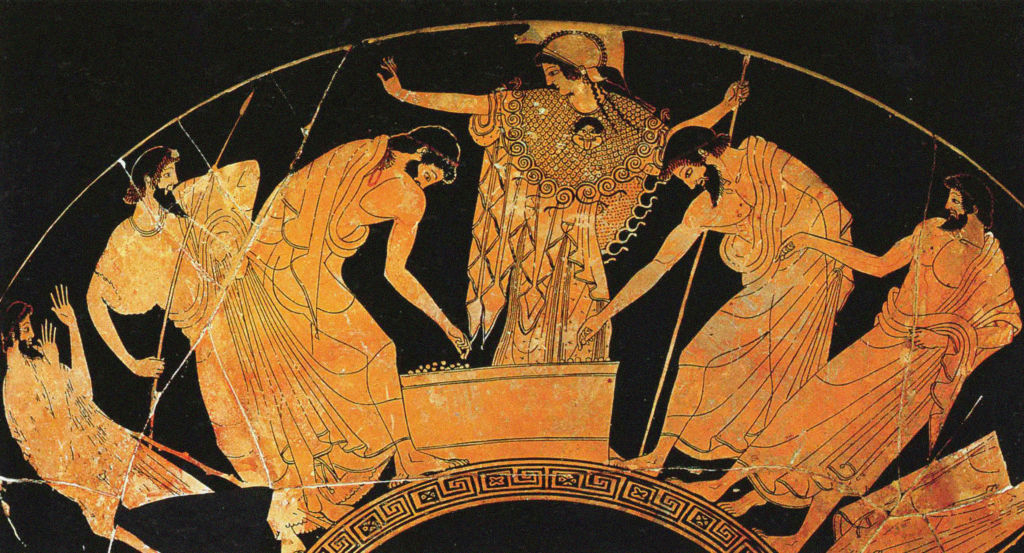In blows the dark of winter, bringing with it partially estranged family members, seemingly endless nights and all those television movies about a big boss lady who gets stranded in a small town for the holidays and learns the true meaning of Christmas by falling in love with a lumberjack.
It is not a great time of year. But as every sullen teenager knows, headphones are a great way to escape the gathering and retreat inward. There is an abundance of podcasts about how great the holiday season is — how festive, how rich with tradition and meaning. I get through the holidays with day-drinking and bingeing French television shows while shoving cheese into my face, so these don’t really speak to me.
There’s a lot of doom and gloom this year about supply chains: predictions of barren toy-store shelves, visions of middle-aged women screaming at someone being paid $11 an hour when the hottest new toy is nowhere to be seen. “What do you expect Beckett to play with this holiday season, a Lincoln Log set?” The hopelessly cynical among us, tired of the world and its toxic plastic stuff, should listen to Business Wars: Fast Fashion as we stand in line for security at the airport.
How did we get to our false sense of abundance and availability? Where we firmly believe that shirts should cost no more than $5.99 and that they should come in infinite varieties and colors? Where we don’t shop anymore, but have “experiences”? Our every need satisfied by a wool scarf with an unnecessary fringe, or by a studded polyester tank top that pairs beautifully with those white skinny jeans that never fully cover our asses? Where the countries that make this junk produce so much of it that they actually burn the excess for fuel?
Fast Fashion takes us into the fierce competition between places like Zara, Topshop, Forever 21, H&M and Uniqlo as they fight for dominance over the cheap and shoddily-made clothing market. Mindless consumption is not only normalized, it’s aspirational.
Meanwhile, landfills in other nations and the ocean overflow with all this product. But who cares? Huge profits are being made. It’s enough to make you think, well, maybe this is why we don’t deserve nice things.
Yes, the series has an inveterate tendency to dramatize and hyperbolize. And it does so in a particularly cringey way, through absolutely unnecessary dialogues. But it’s good for smug, I-told-you-so listening when by February (according to the social media hysteria I have encountered) we will probably have to start foraging our own food again and commence spear-hunting the wild boars of Texas.
I prefer spending the winter months the old-fashioned way: lying around and imagining what monstrous things live outside in the darkness, waiting to do us harm. For that, I recommend University College Dublin’s podcast Blúiríní Béaloidis / Folklore Fragments. These long, winding conversations with academics, artists and writers — about creatures like the trickster Puca, the howling Banshee or the extremely un-PC Changeling — are serious-minded but totally unsettling. Here you are, in your poorly lit room, listening intently to Professor Patricia Lysaght talk about how the Banshee relates to intergenerational trauma and dealing with the uncertainty of death in dark times, and all of a sudden you hear something outside and OH MY GOD WHAT WAS THAT. This is the true reason for the season, and you can’t convince me otherwise.
Blúiríní Béaloidis comes out sporadically, which only adds to its allure as far as I am concerned. It is as wild and uncontrollable as the folklore figures it describes, drifting in and sneaking back out the upstairs window you forgot to lock. And while it is affiliated with a university humanities department (and has all of the bad production quality to prove it), its hosts always remember eventually to get past the historical analysis and return to the reasons why we tell the stories in the first place: because we are scared, lonely, drunk or having a good time freaking each other out around the fire; because we need to make sense of an ever-changing world and the fates that have their way with us. Which is basically why we keep getting on planes to see our families each year around this time. Merry whatevers.
This article was originally published in The Spectator’s December 2021 World edition.

























